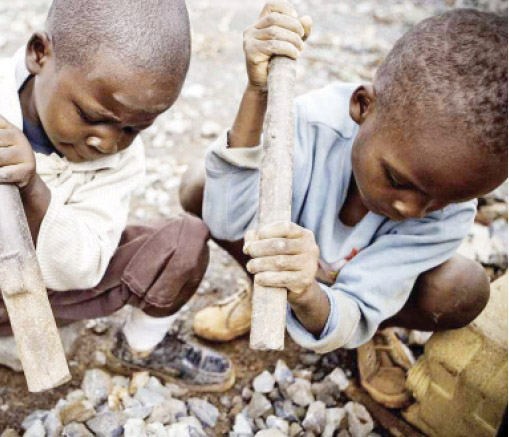The global community marked World Day Against Child Labour on June 12. Senior Correspondent, ONYEWUCHI OJINNAKA, brings to fore the inherent risks in using children for cheap labour.
“Child labour has no place in well-functioning and well-regulated markets, or in any supply chain. The message that we must act now to stop child labour once and for all has been affirmed by the Sustainable Development Goals (SDGs). Acting together, it is within our means to make the future of work a future without child labour.”
These are the words of International Labour Organisation (ILO) Director-General, Guy Ryder, in his message to mark the 2016 edition of World Day against Child Labour (WDACL), observed the world over today.
June 12 is set aside every year by the ILO to draw attention to the millions of children around the world whose rights are being denied.
With about 168 million children still oppressed through child labour, all supply chains, from agriculture to manufacturing, services to construction, run the risk that child labour may be existing. ‘Child Labour in Global Supply Chains’ is the theme of this year’s edition.
ILO estimates that among the 168 million children involved in child labour globally, 85 million are engaged in hazardous work that jeopardises their health or safety.
To commemorate the 2016 World day Against Child Labour, a Geneva-based Human Rights Watch (HRW) urged governments to better regulate businesses to prevent child labour in global supply chains. It claimed that millions of children risk pain, sickness, injury and even death to produce goods and services for the global economy.
Jo Becker, children’s rights advocacy director of HRW said: “Consumers usually have no way of knowing whether the food they eat, the clothing and jewellery they wear, or other products they buy were made with child labour,” cautioning companies not to profit from the exploitation of children.
HRW said it has documented hazardous conditions for children mining gold in Ghana, Mali, Tanzania and Philippines.
According to the rights group, an estimated one million children worldwide work in small-scale, labour-intensive mines, and 15 per cent of the world’s gold is sourced from artisanal mines. Children risk death and injury climbing into unstable mine shafts and carrying heavy bags of ore. They also may suffer irreversible brain damage from handling mercury, a highly toxic substance used to process gold that is exported to refineries in Dubai and Switzerland.
Commemoration of WDACL in Nigeria
Edo State-based non-governmental organisation, Child Protection Network (CPN), as part of activities marking the WDACL, has called for the enactment of child’s rights law and demanded immediate establishment of family court to take care of cases of abuse against children.
Coordinator of CPN, Ms Jennifer Ero, during a protest march with students in Benin City, the state capital, said: “We need family court to stop rape and child labour. Without family court, the law would be just dormant.”
The group also demanded, for children, freedom from discrimination, right to healthcare services, free access to education and protection from abuse and exploitation, including child labour and rape.
Speaking with TheNiche, a volunteer officer with Women’s Rights and Health Projects (WRAHP), Vivian Emesowum, said “experience has shown that child labour is a problem that comes from parents”. She made reference to the law that exempts a child or minor from taking decision or consent on his or her own.
Her words: “Children are not responsible for their actions, but the parents.”
She fingered failure of the family as one factor that breeds child labour. “We need to go to the family because when the parents are not doing what they are supposed to do, the problems would then go back to the child and he bears the brunt.”
In the view of Emesowum, most parents have failed to love their children equally, adding that once a family is divided, the effect goes back to the child.
Programme officer with Partnership for Justice (PJ), Ivy Bafil-Ofili, told TheNiche that child labour cuts across different aspects.
She cited children who are used as house-helps, hawkers, as well as those who could not attend a regular school as part of child labour.
“Depriving a child of her/his childhood is also a form of child labour. Children performing work that, at their level, they are not supposed to do, minors working in industries, house-helps doing different kinds of work for their mistresses or masters are all child labour,” she added.
Bafil-Ofili also attributed the cause of child labour to poverty in the society, adding that in talking about child labour, one has to look at the environment.
She lamented that a lot of “those children are prone to rape and different vices, as there are cases of rape and sexual abuse on children hawking.”
Panacea
To nip this menace in the bud, Bafil-Ofili suggested that children should be allowed to enjoy their childhood, to be in school in a good environment and good protection policy put in place for them.
“There should be policy to ensure that child trafficking is brought down to the barest minimum. Industries and companies should have the policy in place. The law should protect children from employment for cheap labour,” she advocated.
She urged government agencies to put programmes and law in place to ensure that children are protected from abuses.














